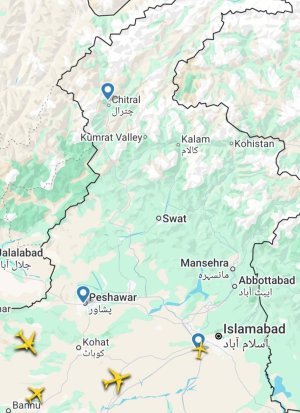NA passes ATA amendments allowing 3-month ‘preventive detention’ of terror suspects
The National Assembly on Wednesday passed an amendment to the Anti-Terrorism Act (ATA), 1997, which reinserted powers granted to law enforcement authorities and the armed forces to detain “suspicious” individuals for up to three months.
Section 11EEEE (preventive detention for inquiry) of the ATA was amended in 2014, providing the government and authorised armed forces and civil armed forces with the authority to conduct preventive detention of individuals suspected of involvement in terrorism-related activities. However, this amendment was subject to a sunset clause, limiting its validity to two years, which expired in 2016.
In November 2024, the government quietly introduced the bill in the NA, seeking to grant military and civil armed forces the authority to keep individuals facing terrorism charges in ‘preventive’ detention for up to three months.
The bill to amend the act was moved in parliament by Minister of State for Interior and Narcotics Control Tallal Chaudhry.
In its statement of objectives and reasons, the bill read that Section 11EEEE was amended in 2014, and was designed to empower law enforcement agencies to pre-emptively address security threats by detaining suspects for a period not exceeding three months to conduct thorough inquiries
“However, this amendment was subject to a sunset clause, limiting its validity to a period of two years, which expired in 2016,” the bill read.
“Further, the current security situation requires a robust response that goes beyond the existing legal framework. The erstwhile amendment of Section 11EEEE of the act, ibid, are required to be re-inserted to empower the government, armed forces, and civil armed forces with the necessary authority to detain individuals who pose a significant threat to national security,” it added.
“This provision would allow for the preventive detention of suspects based on credible information or reasonable suspicion, thereby disrupting terrorist plots before they can be executed. This will also provide law enforcement agencies with the legal backing to conduct more effective operations against terrorism,” the bill read. “It would facilitate the use of Joint Interrogation Teams (JITs), composed of members from various law enforcement and intelligence agencies, to conduct comprehensive inquiries and gather actionable intelligence.”
According to the Associated Press of Pakistan, the House passed the bill through a clause-by-clause read. Earlier, the House adopted a motion to consider the bill with 125 votes in its favour and 59 against it.
A copy of the bill available with Dawn.com stated that in sub-section (1), the detention of a person arrested under Section 11EEEE, including detention exceeding three months, would be subject to the provisions of Article 10 (safeguards as to arrest and detention) of the Constitution.
The bill outlined an amendment to sub-section (1) of Clause 2 of Section 11EEEE, which reads as follows:
“The Government or, where the provisions of section 4 have been invoked, the armed forces or civil armed forces, as the case may be subject to the specific or general order of the Government in this regard, for a period not exceeding three months and after recording reasons thereof, issue order for the preventive detention of any person who has been concerned in any offence under this act relating to the security or defence of Pakistan or any part thereof, or public order relating to target killing, kidnapping for ransom, and extortion, bhatta, or the maintenance of supplies or services, or against whom a reasonable complaint has been made or credible information has been received, or a reasonable suspicion exists of his having been so concerned, for purpose of inquiry.”
Meanwhile, in sub-section 2, the following amendments were proposed:
“In sub-section (2), for the proviso, the following shall be substituted, namely: provided that where the detention order has been issued by the armed forces or civil armed forces under sub-section (1), the inquiry shall be conducted by the JIT comprising of a police officer not below the rank of superintendent of police, intelligence agencies, civil armed forces, armed forces, and other law enforcing agencies and for sub-section (2A), the following shall be substituted, namely: (2A) The provisions of sub-sections (1) and (2) shall remain in force for a period of three years from the commencement of the Anti-Terrorism (Amendment) Act, 2025.”
The bill also incorporated an amendment to sub-section 2 Section 11EEEE (preventive detention for inquiry) of the ATA — which is available with Dawn.com — which would grant the armed forces or civil armed forces the power to arrest a “suspicious person” for three months. The amendment was moved by PPP MNA Naveed Qamar.
“In clause 2, in paragraph (a), in section 11EEEE, in proposed sub-section (1), for the expression ‘a reasonable complaint has been made or credible information has been received, or a reasonable suspicion exists’, the expression ‘sufficient grounds exist’ shall be substituted,” Qamar’s amendment read.
Law Minister Azam Nazeer Tarar said in the House that this law would only be used in specific situations.
“A clause is being added to the bill stating that there are solid reasons for arrest,” Tarar stated. “The arrested person will have to be presented before a magistrate within 24 hours [and] a clause has also been included to be enforceable for a specific period.”
Reacting to the passage of the motion to amend the ATA, PTI Chairman Barrister Gohar Ali Khan noted that a similar law was brought previously and branded it a violation of “fundamental human rights”.
“The Supreme Court said these laws were contrary to fundamental rights,” Gohar said. “You cannot touch a single person in the world without a solid reason.”
PTI senior leader and former NA speaker Asad Qaiser assailed the bill and rejected it in his address.
“A new legislation has been passed, where you can be kept in prison for months without permission,” he stated. “These laws can be misused and will target political opponents.”
Qaiser stated that he only wanted peace and commerce in the country, warning that the Constitution was being “destroyed”.
Jamiat Ulema-i-Islam-Fazl chief Maulana Fazlur Rehman lamented that Pakistan’s anti-terrorism legislation against corruption and mismanagement made every citizen “inherently criminals”.
“A person is first arrested and then later proven guilty. There is no room for such legislation in the world,” he said.
“Terrorism has not stopped. I cannot even return to my village now,” he added.
“A guest in our area was told that extremists are in control outside. Legislation has made no difference, as this parliament has no importance. They create laws based on signals.”
Addressing NA Speaker Sardar Ayaz Sadiq, Fazl told him that “parliament should not be taken hostage” in his presence.
He also called the National Action Plan a piece of “discriminatory legislation”, stating that he rejected it in the past and continued to do so.
Aseefa slams Utility Stores Corporation closure
Separately, First Lady Aseefa Bhutto-Zardari assailed the countrywide closure of the Utility Stores Corporation (USC) despite the government’s assurance last year that it would not be.
Established in 1971, USC was a state-owned enterprise (SOE) tasked with supplying essential commodities at subsidised rates, primarily targeting low-income households. It operated over 4,000 retail outlets nationwide. The closure last month of the SOE not only left thousands of employees in a state of shock, but has also triggered deep concern among low-income consumers who depended on the network for essential goods at subsidised rates.
Aseefa recalled the PPP submitting a calling-to-attention notice on the issue of USC outlets’ closure.
“Despite the assurances from the honourable minister sitting here today, we have unfortunately found out that utility stores are being closed and hundreds of thousands of people are now unemployed,” she said.
“As a result, their families are facing severe hardship. This is a clear injustice and we demand a clear answer from the government. I request the government to give attention to this again.”
Minister for Food Security Rana Tanveer acknowledged that he said on the NA floor that utility stores would not be shut down. “This was done in a phased manner; loss-making stores were closed first, and some people on daily wages were fired,” he outlined.
“But there was a separate formula for those on contract and regular [employment] — a package for their future safety was made in not less than Rs20 billion, which we will give them.
“Although I have no involvement in this process, from my understanding, the permanent employees will be adjusted and for those willing to take the package, monetary compensation will be given to them.”
Recalling this year’s Rs20bn Ramazan Package, Tanveer quoted Prime Minister Shehbaz Sharif as saying that it was better to distribute cash rather than have leakages in the utility stores and have people lining up in the summer.
“Cash payments were transferred directly through a digital wallet, which was of benefit to the recipients as there were no deductions by banks,” he stated.
“I think that this time as well, the recipients of utility stores who used to take items from there will be given cash based on the same formula.
“There is no doubt that utility stores have been closed and people have been protesting,” Tanveer noted, adding that a team comprising Special Assistant to PM Haroon Akhtar, Adviser to the PM on Inter-Provincial Coordination Rana Sanaullah and other officials held talks and resolved the issue.
Responding to the minister, Aseefa said, “I would urge the minister that he had promised his coalition partners in this House that he was not going to close these utility stores.”
She added that the issue had been taken up by the Standing Committee on Finance and Revenue as well, which was told the same.
Bill states powers of Section 11EEEE needed to be reinserted due to "current security situation" and need for "robust response"; Aseefa slams Utility Stores Corporation closure.
www.dawn.com
“I urge the cabinet, I urge the government at this time to please reconsider and please revisit this. And to the downsizing committee: we need to be strengthening our utility stores, not downsizing them and not closing them down.”
NA Speaker Ayaz Sadiq then asked Tanveer to arrange a meeting, to which the minister agreed and asked the finance committee to nominate their representative for it.





















